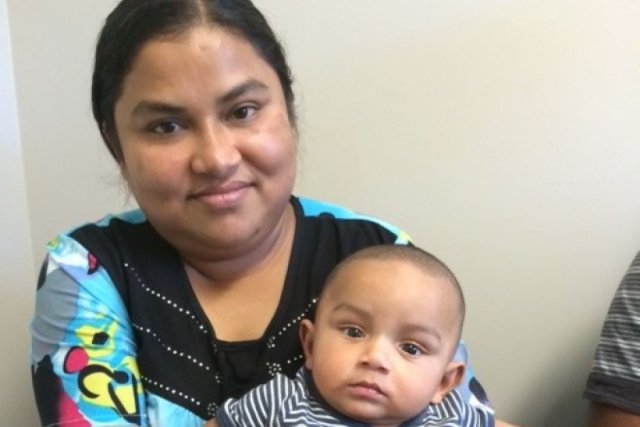
The decision to deny 11-month-old Ferouz Myuddin a protection visa precedes a plan by Tony Abbott’s government to retrospectively deny all babies born to asylum seekers the right to seek refugee status.
An amendment bill containing extensive changes to the Migration Act was tabled by the federal government last month. The bill would remove most references to the refugee convention and legalise boat turnarounds.
The Coalition government also wants all babies born to asylum seekers who arrived by boat after August 13, 2012 to be declared “unauthorised maritime arrivals”.
This includes babies born in Australia, such as Ferouz — whose mother had to be transferred from Nauru to Brisbane’s Mater hospital because of the island camp’s unfit conditions — and about 100 other babies.
The Nauru detention camp made headlines less than a month ago over allegations that children were being sexually abused. There have also been consistent reports of the unsafe conditions in the detention compounds, such as limited clean water, filthy toilet facilities, inadequate medical care and the island’s uncomfortable climate.
Detention of children causes severe damage to their health and development. The immigration department recorded 128 incidents of self-harm by children in its detention centre from January last year to March this year. On Nauru alone, children have witnessed deeply traumatic events including suicide attempts and lip-stitching.
Ferouz’s Rohingya parents have experienced Nauru’s conditions and were so desperate to avoid being sent back, they took the government to court after it refused to grant Ferouz a protection visa.
But Brisbane’s Federal Circuit Court Judge, Michael Jarrett, decided on October 15 that Ferouz was in fact an “unauthorised maritime arrival” — a euphemism for refugees with increasingly fewer rights in Australia.
Walter Sofranoff, a lawyer for the family, said the ruling, in effect, deemed being born “an act of entry” in the country. He said the immigration department was wrong to deny the child a protection visa and that the decision would be appealed.
The bid for Ferouz’s protection was a test case against the former Labor government’s decision to send all refugees who arrived by boat after July 19, 2013 to offshore detention, which has been expanded by the government.
Its dismissal was deeply disappointing for refugee advocates.
The Asylum Seeker Resource Centre said the decision was “manifestly unjust”. “No reasonable Australian would think it’s acceptable to send babies and children to live in the unsanitary and unsafe conditions on Nauru, without any opportunity to grow and develop,” the group said as the decision was announced.
“Eighty per cent of paediatricians, along with the Australian Medical Association, believe mandatory detention of children is a form of abuse.”
Jarrett also said, with little evidence, that he backed the government view that denying Ferouz’s case was intended to “discourage people smugglers”.
The ruling also backs the government’s plans to further erode the rights of refugees under Australian law. The Migration and maritime powers legislation amendment (resolving the asylum legacy caseload) bill 2014 would amend several laws, such as the Migration Act and the Maritime Powers Act.
As well as restricting the legal status of children born to asylum seekers, the 118-page bill aims to sweep many rights and protections from government responsibility.
It would also give the government new powers to abuse people seeking protection.
Human Rights Commissioner Gillian Triggs called the bill “offensive to the rule of law”.
The Refugee Council of Australia said the bill would “extend the government’s powers to stop asylum seeker boats at sea” and “restrict the courts’ capacity to invalidate government actions at sea”.
The council said in a briefing for its members: “The rules of natural justice would not apply to a range of powers in the Maritime Powers Act and a court would not be able to invalidate a government action at sea due to a failure to consider or comply with Australia’s international obligations or the domestic law or international obligations of any other country.”
This has been correctly interpreted by many as immigration minister Scott Morrison’s attempts to destroy the case of 157 Tamil asylum seekers now before the High Court.
The case is a groundbreaking legal challenge to Australia’s powers to intercept boats at sea, which is due to hear evidence from the United Nations. But it could be scuttled by the federal government retrospectively legalising its own actions.
The amendment bill would also create a fast-track assessment process, limit independent merits review processes, allow the minister to cap the number of protection visas issued, and make temporary protection and “safe haven” visas the only visas available to those found to be refugees.
Triggs wrote in the Age on October 8: “Hopefully, Parliament has the sense to reject these retrograde and internationally embarrassing provisions.”
But the Coalition shows no hesitation to make dirty deals with the likes of the Palmer United Party and the legislation is symbolic of Australia’s racist race to the bottom.
Ferouz is the latest victim, but he won’t be the last.
Like the article? Subscribe to Green Left now! You can also like us on Facebook and follow us on Twitter.